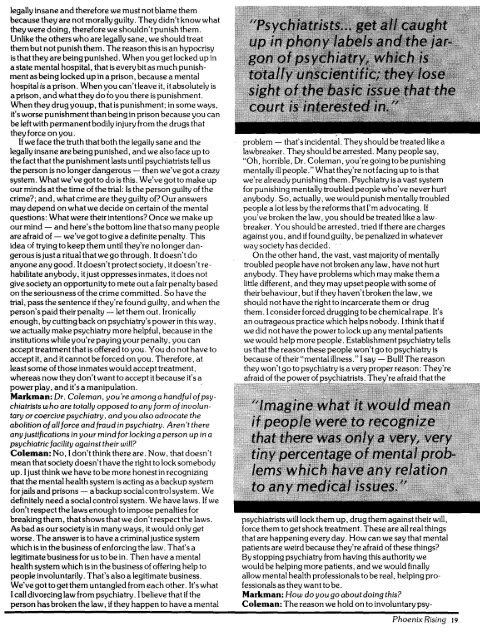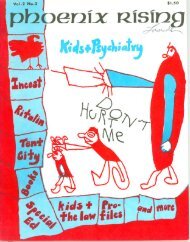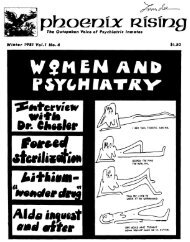Vol. 5, No. 4 - Psychiatric Survivor Archives of Toronto
Vol. 5, No. 4 - Psychiatric Survivor Archives of Toronto
Vol. 5, No. 4 - Psychiatric Survivor Archives of Toronto
Create successful ePaper yourself
Turn your PDF publications into a flip-book with our unique Google optimized e-Paper software.
legally insane and therefore we must not blame them<br />
because they are not morally guilty. Theydidn't know what<br />
they were doing, therefore we shouldn't punish them.<br />
Unlike the others who are legally sane, we should treat<br />
them but not punish them. The reason this is an hypocrisy<br />
is thatthey are being punished. When you get locked up in<br />
a state mental hospital, that is every bit as much punishment<br />
as being locked up in a prison, because a mental<br />
hospital is a prison. When you can't leave it, it absolutely is<br />
a prison, and what they do to you there is punishment.<br />
When they drug you up, that is punishment; in some ways,<br />
it's worse punishment than being in prison because you can<br />
be left with permanent bodily injury from the drugs that<br />
they force on you.<br />
Ifwe face the truth that both the legally sane and the<br />
legally insane are being punished, and we also face up to<br />
the fact that the punishment lasts until psychiatrists tell us<br />
the person is no longer dangerous - then we've got a crazy<br />
system. What we've gotto do is this. We've got to make up<br />
our minds at the time <strong>of</strong> the trial: Is the person guilty <strong>of</strong> the<br />
crime?; and, what crime are they guilty <strong>of</strong>? Our answers<br />
may depend on what we decide on certain <strong>of</strong> the mental<br />
questions: What were their intentions? Once we make up<br />
our mind - and here's the bottom line that so many people<br />
are afraid <strong>of</strong> - we've got to give a definite penalty. This<br />
idea <strong>of</strong> trying to keep them until they're no longer dangerous<br />
isjust a ritual that we go through. It doesn't do<br />
anyone any good. It doesn't protect society, it doesn't rehabilitate<br />
anybody, itjust oppresses inmates, it does not<br />
give society an opportunity to mete out a fair penalty based<br />
on the seriousness <strong>of</strong> the crime committed. So have the<br />
trial, pass the sentence ifthey're found guilty, and when the<br />
person's paid their penalty -let them out. Ironically<br />
enough, by cutting back on psychiatry's power in this way,<br />
we actually make psychiatry more helpful, because in the<br />
institutions while you're paying your penalty, you can<br />
accept treatment that is <strong>of</strong>fered to you. You do not have to<br />
accept it, and it cannot be forced on you. Therefore, at<br />
least some <strong>of</strong> those inmates would accept treatment,<br />
whereas now they don't want to accept it because it's a<br />
power play, and it's a manipulation.<br />
Markman: Dr. Coleman, you're among a handful <strong>of</strong> psychiatrists<br />
who are totally opposed to any form <strong>of</strong> involuntary<br />
or coercive psychiatry, and you also advocate the<br />
abolition <strong>of</strong> allforce and fraud in psychiatry. Aren't there<br />
any justifications in your mind for locking a person up in a<br />
psychiatric facility against their will?<br />
Coleman: <strong>No</strong>, Idon'tthink there are. <strong>No</strong>w, that doesn't<br />
mean that society doesn't have the right to lock somebody<br />
up. Ijust think we have to be more honest in recognizing<br />
that the mental health system is acting as a backup system<br />
for jails and prisons - a backup social control system. We<br />
definitely need a social control system. We have laws. If we<br />
don't respect the laws enough to impose penalties for<br />
breaking them, that shows that we don't respect the laws.<br />
As bad as our society is in many ways, it would only get<br />
worse. The answer is to have a criminal justice system<br />
which is in the business <strong>of</strong> enforcing the law. That's a<br />
legitimate business for us to be in. Then have a mental<br />
health system which is in the business <strong>of</strong> <strong>of</strong>fering help to<br />
people involuntarily. That's also a legitimate business.<br />
We've got to get them untangled from each other. It's what<br />
I call divorcing law from psychiatry. Ibelieve that ifthe<br />
person has broken the law, ifthey happen to have a mental<br />
problem - that's incidental. They should be treated like a<br />
lawbreaker. They should be arrested. Many people say,<br />
"Oh, horrible, Dr. Coleman, you're going to be punishing<br />
mentally illpeople." What they're not facing up to is that<br />
we're already punishing them. Psychiatry is a vast system<br />
for punishing mentally troubled people who've never hurt<br />
anybody. So, actually, we would punish mentally troubled<br />
people a lot less by the reforms that I'm advocating. If<br />
you've broken the law, you should be treated like a lawbreaker.<br />
You should be arrested, tried ifthere are charges<br />
against you, and iffoundguilty, be penalized in whatever<br />
way society has decided.<br />
On the other hand, the vast, vast majority <strong>of</strong> mentally<br />
troubled people have not broken any law, have not hurt<br />
anybody. They have problems which may make them a<br />
little different, and they may upset people with some <strong>of</strong><br />
their behaviour, but ifthey haven't broken the law, we<br />
should not have the right to incarcerate them or drug<br />
them. Iconsider forced drugging to be chemical rape. It's<br />
an outrageous practice which helps nobody. Ithink that if<br />
we did not have the power to lock up any mental patients<br />
we would help more people. Establishment psychiatry tells<br />
us that the reason these people won't go to psychiatry is<br />
because <strong>of</strong> their "mental illness." I say - Bull! The reason<br />
they won't go to psychiatry is a very proper reason: They're<br />
afraid <strong>of</strong> the power <strong>of</strong> psychiatrists. They're afraid that the<br />
psychiatrists will lock them up, drug them against their will,<br />
force them to get shock treatment. These are all real things<br />
that are happening every day. How can we say that mental<br />
patients are weird because they're afraid <strong>of</strong> these things?<br />
By stopping psychiatry from having this authority we<br />
would be helping more patients, and we would finally<br />
allow mental health pr<strong>of</strong>essionals to be real, helping pr<strong>of</strong>essionals<br />
as they want to be.<br />
Markman: How do you go about doing this?<br />
Coleman: The reason we hold on to involuntary psy-<br />
Phoenix Rising 19
















